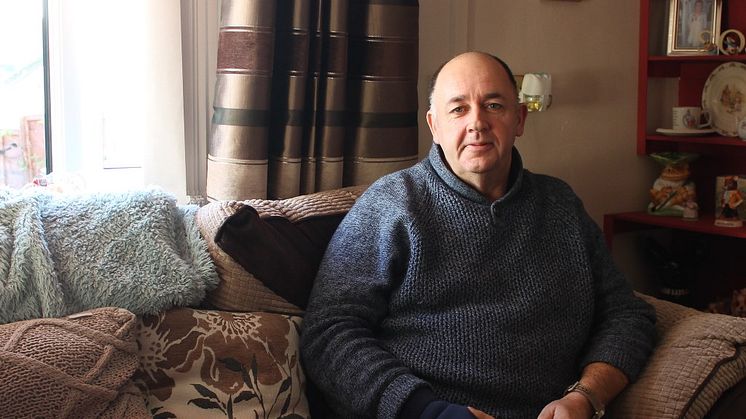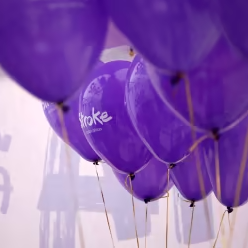
Press release -
Wales campaign launched to lower the nation’s risk of stroke
The Stroke Association has launched a Wales-wide campaign aimed at reducing the number of strokes across the country.
Three specific risk factors put people at an increased risk of having a stroke. The charity’s Lower your risk of stroke campaign will raise awareness of the number of strokes caused by high blood pressure, Atrial Fibrillation (AF) and Transient Ischaemic Attacks (TIAs), also known as mini-strokes.
Ana Palazón, Director Cymru of the Stroke Association, said:
“By taking action on three of the biggest stroke risk factors, we could reduce the number of strokes across Wales by up to 50%. We are asking people to do three simple things:
- Get their blood pressure checked once a year
- Check their pulse for any irregularity
- Seek medical attention immediately should they experience any stroke symptoms such as facial weakness, arm weakness or slurred speech.”
Paul Gurney, 55, was working away from home when had a stroke in March 2016.
The manager of a courier firm, Paul, had been working long hours and his stroke struck on a weekend when he was home alone. He’s not sure just how long he was sat in his living room before his brother called him on the Tuesday.
Paul, from Evanstown, explained, “He thought I’d been drinking because I wasn’t making any sense. I’d been texting him and my wife and they were receiving messages full of gibberish. When he realised something was seriously wrong he came to see me.”
Paul’s face was drooping on one side when his brother arrived so he called an ambulance straight away.
“I remember I lost control of my arm and leg and my loss of speech was a major concern. The paramedics told my brother that they didn’t know how I was still alive. My blood pressure was 200/140 when it should be around 120/80!”
High blood pressure is one of the biggest risk factors for stroke, contributing to 54% of strokes. High blood pressure does not have any symptoms so the only way to know if you have it is to have your blood pressure measured regularly.
Atrial Fibrillation (also known as AF) is the most common type of irregular heartbeat in Wales. People living with AF are five times more likely to have a stroke and strokes caused by AF are more likely to lead to death, or leave the survivor with high levels of disability.
The third biggest risk factor is a Transient Ischaemic Attack which happens when the brain’s blood supply is interrupted for a short time only. Although the symptoms may not last long, a TIA is still very serious. It’s a sign that a person is at risk of going on to have a stroke. That is why a TIA is often called a warning stroke yet too many people are unaware of the link between TIA and stroke and they are not seeking the services and support they need. Often, people dismiss the symptoms of a TIA as a “funny turn”; however doing so could endanger life as more than 25% of people who have a stroke have had a previous stroke or TIA.
The Stroke Association is working with Welsh Government and the seven health boards across Wales to raise awareness across the whole population. The focus of the campaign will be on encouraging members of the public to take responsibility for regularly checking their pulse and blood pressure, and making sure they seek emergency medical treatment when they suspect an irregularity or experience stroke symptoms.
Ana continued, “All stroke symptoms should be treated seriously, no matter how quickly they pass. People should look out for facial weakness or drooping, loss of mobility down one side or problems with speech.
“The Act FAST message is vitally important; Face, Arm, Speech and Time to call 999. The sooner people get medical help, the better their outcomes and the lesser their disability. Don’t ignore funny turns, call 999 immediately.”
Paul concluded, “I’ve got my speech back after the stroke but I get my words confused especially if I’m tired. My short term memory can be terrible and I have to keep a notebook handy.
“My wife is terrified I’ll have another stroke so I’ve worked hard to make changes. I’ve stopped smoking and drinking, went completely cold turkey, and now I walk the dog once a day for 20 minutes. I’m proud to say I’ve lost five stone but it was a drastic way to realise I had to take better care of myself.
“I’m pleased to be able to get involved in the Stroke Association’s campaign to remind people to take any symptoms seriously. I had terrible headaches before the stroke but didn’t get them checked out. I was lucky to survive so don’t take that chance.”
For more information about the campaign, please email info.cymru@stroke.org.uk or follow @strokewales and #StrokeRisk on Twitter. If stroke has affected you or a family member please ring our helpline on 0303 3033 100.
Topics
A stroke is a brain attack which happens when the blood supply to the brain is cut off, caused by a clot or bleeding in the brain. There are around 152,000 strokes in the UK every year and it is one of the largest causes of disability. There are over 1.2 million people in the UK living with the effects of stroke.
Stroke Association is a charity. We believe in life after stroke and together we can conquer stroke. We work directly with stroke survivors and their families and carers, with health and social care professionals and with scientists and researchers. We campaign to improve stroke care and support people to make the best recovery they can. We fund research to develop new treatments and ways of preventing stroke. The Stroke Helpline (0303 303 3100) provides information and support on stroke. More information can be found at www.stroke.org.uk











